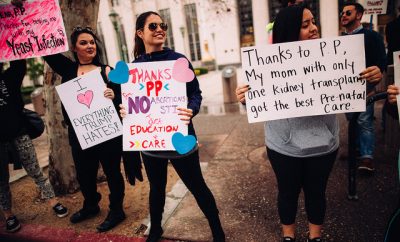 Image courtesy of [reynermedia via Flickr]
Image courtesy of [reynermedia via Flickr]
Law
Non-Profit Organizations: What are the Rules?
It seems like every month we see the announcements on Facebook. One friend might post how they’re “lighting up the town blue for Autism awareness!” or notify you that they’re “running to support The March of Dimes, please donate here!” You might get calls from various organizations asking you to donate, or get stopped on the street. But no matter where we are, we can’t help but notice that there are a lot of nonprofit organizations out there that want to collect money.
However, there are also those headlines that scare us away from donating money. We see allegations of fraud, mismanagement, and funds never reaching the very people that they are intended to help.
So what is the truth behind non-profits, should you feel safe donating, and most importantly, what rules must non-profits follow?
What is a Non-Profit Organization?
Non-profits (also known as NPOs or non-business entities) seem to confuse a lot of people, especially those who aren’t involved or actively participate in one. Many people will simply say that another word for non-profit is “charity,” which isn’t totally correct. According to the Cornell Legal Information Institute, a non-profit is more complicated:
A non-profit organization is a group organized for purposes other than generating profit and in which no part of the organization’s income is distributed to its members, directors, or officers. Non-profit corporations are often termed ‘non-stock corporations.’ They can take the form of a corporation, an individual enterprise (for example, individual charitable contributions), unincorporated association, partnership, foundation (distinguished by its endowment by a founder, it takes the form of a trusteeship), or condominium (joint ownership of common areas by owners of adjacent individual units incorporated under state condominium acts).
Non-profits cannot just form out of thin air from already existing companies, as they must be designated as a non-profit in their charters. According to the Cornell Institute, “Non-profit organizations include churches, public schools, public charities, public clinics and hospitals, political organizations, legal aid societies, volunteer services organizations, labor unions, professional associations, research institutes, museums, and some governmental agencies.”
A key difference between non-profits and for-profit organizations is that when a for-profit organization goes out of business, the shareholders can get what’s leftover. But when a nonprofit goes out of business, any remaining assets must be given to another nonprofit.
Some of the most popular non-profits include: National Public Radio (NPR), United Nations Children’s Fund (UNICEF), Human Rights Watch (HRW), WikiLeaks, Green Peace, the Smithsonian Institute, Human Rights Campaign, Kiva, and Doctors Without Borders.
What are the legal requirements to be a non-profit?
Many nonprofit groups want to be considered non-profits because it will help them avoid federal or state taxes. Non-profits often receive tax exemptions from Section 501(c)(3) of the Internal Revenue Code, which is why nonprofits are sometimes referred to “501(c)(3)s.” State laws are typically stricter than federal laws when it concerns non-profits, and each state has its own set of rules and regulations, though many states do overlap.
State Laws
State laws have big consequences for any non-profits that don’t strictly follow the rules. There are many lawyers who specifically work with non-profits, as the nomenclature can be quite confusing and dense, especially for people who have never taken law classes. A nonprofit that operates in more than one state will need to pay attention to the laws that affect its work in each jurisdiction.
Twenty-six states require that non-profits complete an audit so that they are able to participate in fundraising activities from year to year. According to the National Council of Non-Profits, “thirty-nine states (including the District of Columbia) require charitable nonprofits to register with the state in order to fundraise in that state.” Over half of the states require some form of audit every year, whether the group actively fundraises or not. For example, Maine is particularly strict with licensing and requires renewals each year.
Many of the audits that take place within a state for the government must be done by an independent auditor, or someone who does not have stake in either the company or the government.
To see more about your specific state, visit the National Council of Non-Profits interactive page.
Political Non-Profits
Political non-profits have become some of the largest contributors to elections in the last few decades. Some of these organizations include the often talked-about Super PACs, which pool campaign contributions from members and donate them to campaigns for or against particular candidates. These organizations, predominantly 501(c)(4)s and 501(c)(6)s, “do not have to disclose the sources of their funding–though a minority do disclose some or all of their donors, by choice or in response to specific circumstances.” The anonymity and large scale of these Super PACs have ruffled many feathers, especially within smaller parties.
That may be why the IRS is considering a rule “to police political nonprofits to include political parties and political action committees.” These groups are commonly called “social welfare” groups and operate under those guises, but play by a completely different set of rules.
“If it’s going to be a fair system, it needs to apply across the board,” IRS Commissioner John Koskinen said when asked by POLITICO about the new rule. He continued, “[I]f we have a set of definitions for 501(c)(4)s, what about everybody else? Can they do more or less [political activity]? And for us as [an] administration, for ease of administration, it makes sense to have this common definition.”
Non-Profit Spending
How much of what you give a foundation or non-profit actually goes to the cause depends greatly on the specific organization. For most of these organizations, a good chunk goes toward overhead costs like fundraising, employee salaries, and management costs.
For instance, according to The Street, the Walker Cancer Institute “spent 96.4% of its total funds on overhead in 2012. The nonprofit spent 91.1% of its money to raise more funds and 5.3% for management and general costs. CEO Helen Marie Walker received 1.3% of the nonprofit’s funds in 2012.”
To check on any specific charity, the Charity Navigator has spending information on about 7,000 different charities.
Non-profit Controversies
These groups and organizations are not without controversy and problematic behavior. Some of these controversies arose out of tax issues, while others came from the actions of the group specifically.
Case Study: Autism Speaks
The organization has become one of the best known charities in the United States for autism awareness. However, that doesn’t mean the group is without problems.
Autism Speaks has raised autism awareness significantly, and which has led to better treatment, more donations, and more understanding. The Daily Beast details the meteoric rise of autism funding:
When Autism Speaks began, $15 million in private funding went to autism research. In 2010, according to the Interagency Autism Committee (IACC), the federal task force for shaping government autism policy and funding, that amount surged to more than $75 million, with over $18 million from Autism Speaks.
However Autism Speaks has faced some controversies. One of the major criticism levied against the group is that Autism Speaks considers autism to be a “horror” and a “tragedy” that happens to people and families. Autistic Hoya explains: “Autism Speaks regularly issues propaganda in which they say, ‘The rate of autism is higher than the rate of cancer, childhood diabetes, and AIDS combined,’ which compares a developmental disability to diseases.”
In addition, the group has come under fire for allegedly aligning itself with the Judge Rotenberg Center, which uses electric shock therapy. The video below is graphic, but it details some of the treatment:
Case Study: Susan G. Komen for the Cure
Amidst reports of “pinkwashing” or slapping a pink ribbon on a product and calling it support, Susan G. Komen for the Cure recently made a controversial decision that caused it to lose some respect and support. The call came when “it summarily cut off funding to Planned Parenthood in what appeared to be a bow to anti-abortion crusaders.” That cut stopped Planned Parenthood from performing many of the necessary mammograms that caught breast cancer in women, and was reversed in just three days. In the year following, the group lost almost $40 million in donations, and the damage was done.
But that was just the start of the problems for the foundation. When people started looking into its spending, they found something concerning. According to the Los Angeles Times:
While the foundation depicted itself as devoted chiefly to research for a breast cancer cure, it spent only about 20 percent of its donations on research; the biggest expenditure category was public education, at more than 50 percent. Critics questioned whether ‘education’ really should be such a heavy priority in a field where research issues remain important.
While the organization’s reputation is on the mend, it isn’t quite out of the woods yet and still sees some criticism.
Conclusion
Charities and foundations have an extremely important role in our lives–and we should certainly all try to “pay it forward” every now and again. However, before you make that donation, make sure you do some research about the company you are donating to. If you are making a sizeable donation, there are times when you can choose what you want your donation to go towards. Your best bet will always be to donate goods, services, or your time so that you can know firsthand you are helping out.
Resources
Autistic Hoya: Georgetown: Say No to Autism Speaks
Cornell Legal Information Institute: Non-profit Organizations
LA Times: Susan G. Komen Foundation Discovers the Price of Playing Politics
National Council of Non-Profits: State Law Non-profit Audit Requirements
Politico: IRS May Broaden Rule to Police Political Non-Profits
Daily Beast: “Autism Speaks” – but Should Everyone Listen?
Street: You Won’t Believe the Overhead Costs at These 10 Nonprofits
Huffington Post: The Truth About Corporate Pinkwashing
Idealist: Do Non-profits Go Out of Business?
Investopedia: Independent Auditor?
Open Secrets: Political Nonprofits
Top Non Profits: What are the Top Non-Profit Organizations?
CNN: Above the Law: America’s Worst Charities
Forbes: Why Autism Speaks Doesn’t Speak for Me








Comments